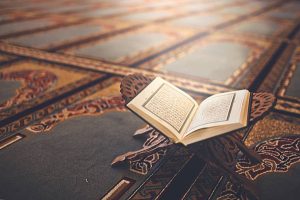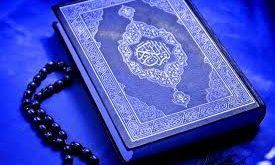عن ابن عباس رضي الله عنهما قال قال رسول الله صلى الله عليه وسلم ما أنفقت الورق في شيء أحب إلى الله من نحر ينحر في يوم عيد رواه الطبراني في الكبير والأصبهاني (الترغيب والترهيب 2/101) Hazrat Ibn Abbaas (radhiyallahu ‘anhuma) reports that Rasulullah (sallallahu ‘alaihi wasallam) said, “There is …
Read More »Recognizing the True Friends of Allah Ta‘ala
Hazrat Shaikh Moulana Muhammad Zakariyya (rahmatullahi ‘alaih) once addressed some of his associates and mentioned the following: I will show you the gauge to determine whether a person is among the servants whom Allah Ta‘ala has blessed with His special recognition and friendship, or whether he is merely pretending to …
Read More »Tafseer of Surah Qadar
بِسۡمِ اللّٰہِ الرَّحۡمٰنِ الرَّحِیۡمِ اِنَّاۤ اَنۡزَلۡنٰہُ فِیۡ لَیۡلَۃِ الۡقَدۡرِ ۚ﴿ۖ۱﴾ وَ مَاۤ اَدۡرٰىکَ مَا لَیۡلَۃُ الۡقَدۡرِ ؕ﴿۲﴾ لَیۡلَۃُ الۡقَدۡرِ ۬ۙخَیۡرٌ مِّنۡ اَلۡفِ شَہۡرٍ ؕ﴿ؔ۳﴾ تَنَزَّلُ الۡمَلٰٓئِکَۃُ وَالرُّوۡحُ فِیۡہَا بِاِذۡنِ رَبِّہِمۡ ۚ مِنۡ کُلِّ اَمۡرٍ ۙ﴿ۛ۴﴾ سَلٰمٌ ۟ ہِیَ حَتّٰی مَطۡلَعِ الۡفَجۡرِ ٪﴿۵﴾ Indeed, We had sent it (the Quraan) down …
Read More »Acquire the Intercession of the Qur’aan Majeed
وعن أبي أمامة الباهلي رضي الله عنه قال سمعت رسول الله صلى الله عليه وسلم يقول اقرؤوا القرآن فإنه يأتي يوم القيامة شفيعا لأصحابه (الترغيب والترهيب، الرقم: 2195) Hazrat Abu Umaamah (radhiyallahu ‘anhu) reports that Rasulullah (sallallahu ‘alaihi wasallam) said, “Recite the Qur’aan Majeed, because it will come on the …
Read More »Sunnats and Aadaab of Speech – Part 15
1. When addressing your elder, speak to him with respect. Do not be rude and disrespectful in your approach. 2. Do not raise your voice above the voice of your elder, nor argue with him.
Read More »Sunnats and Aadaab of Ramadhaan – Part 5
22. The time of sehri commences from the last sixth of the night. However, it is preferable to delay the sehri to the end of the sehri time, before the fast commences (i.e. a little before subah saadiq). Nevertheless, one should not delay so much that there is fear of …
Read More »Availing of the opportunity to do good deeds
Hazrat Moulana Muhammad Ilyaas (rahmatullahi ‘alaih) once mentioned the following: One of the great deceptions of shaitaan is where he creates false hopes within a person of carrying out many good deeds in the future, thereby stopping him from carrying out any good deed at present. Shaitaan’s aim and …
Read More »Rights of Neighbours – The Orchards of Love – Part Twenty-Three
Rights of Neighbours In order for the world to function smoothly and harmoniously, it is imperative for each person to fulfil the rights he owes to others. If people’s rights are not upheld and fulfilled, then chaos and anarchy will prevail in the world. Stealing and usurping of wealth will …
Read More »Sunnats and Aadaab of Ramadhaan – Part 4
17. Increase four actions in Ramadhaan: (a) The recitation of the kalimah ‘laa ilaaha illallah’ (b) Istighfaar (c) Seeking entrance into Jannah (d) Seeking protection from Jahannum عن سلمان رضي الله عنه قال خطبنا رسول الله صلى الله عليه و سلم في آخر يوم من شعبان… واستكثروا فيه من أربع خصال …
Read More »Duaa after Azaan to Remove Difficulties
If a person is in difficulty or hardship, he should reply to the words of the azaan, and thereafter recite the following dua. After completing the dua, he should beg Allah Ta’ala to ease his difficulty and hardship: اللَّهُمَّ رَبَّ هَذِهِ الدَّعْوَةِ الصَّادِقَةِ الْمُسْتَجَابَةِ الْمُسْتَجَابِ لَهَا دَعْوَةِ الْحَقِّ، وَكَلِمَةِ التَّقْوَى، …
Read More » Ihyaaud Deen An Effort to Revive Deen in Totality
Ihyaaud Deen An Effort to Revive Deen in Totality









